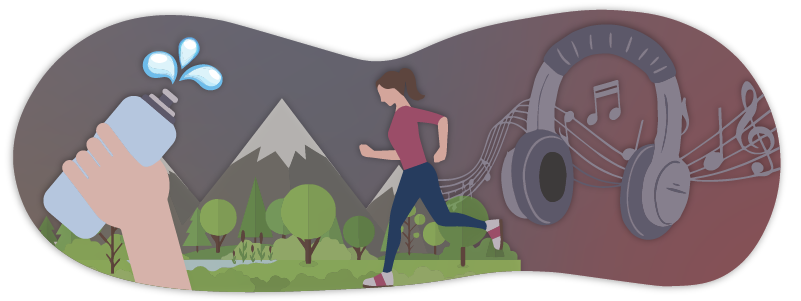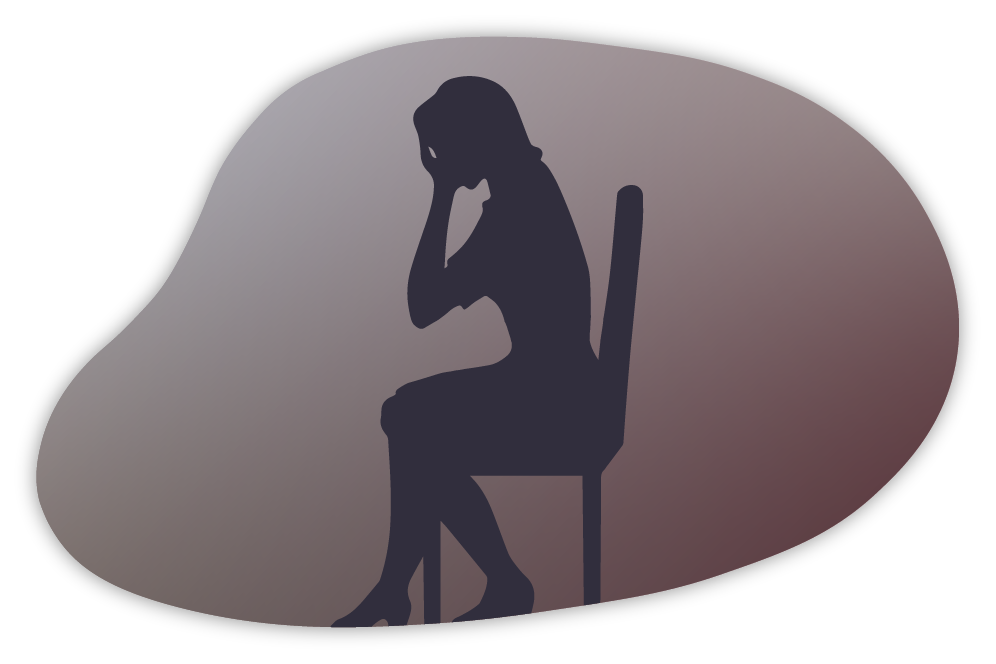Dreams are our mind’s way of subconsciously expressing certain worries, fears, and stressors that we have been feeling. After a traumatic event such as sexual abuse or assault, it is common for survivors to have vivid nightmares re-living or relating to their trauma. This is a telltale sign of PTSD. While many people are aware that a dream is simply their imagination, nightmares have the ability to feel similar to real life. It can trick us into thinking that “this event is really happening” even if it’s only our mind playing a trick on us. This can leave survivors to wake up in a panic, disrupt their quality of sleep, and create more issues for their well being. The more these terrors occur, the more it can make sleeping a stressful event, fearing you’ll re-live painful memories every night. Many people feel as though they have little control over their minds when they enter the dream-like state. However, this is far from the truth and there are ways you can manage and prevent these dreams.
It’s important to remember that frequent nightmares are a result of trauma or prolonged stress. If you don’t have an outlet where you can express upsetting feelings, your mind tries to deal with these emotions in other ways. It would be beneficial for you to track these dreams and speak with a therapist who can not only professionally get your sleep back on track, but also become a trusted outlet.

When we enter a new relationship, we often want to tell a partner our life story; the events that shaped us, and the stuff we wouldn’t disclose to most people. However, opening up about past sexual trauma is not easy, and can oftentimes be triggering to talk about. It can take people years to come to terms with past events, and even longer to to openly talk about it. The uncertainty of how your partner may react or if they’ll look at you differently after disclosing this information can be fear-inducing. Knowing whether or not you open up about sexual trauma can be a confusing process. However, it’s also a decision you don’t have to make instantaneously, and of course, depends on if you feel comfortable disclosing this piece of information. Click here for more tips on how to cope with sexual assault
If your answers to these questions weren’t what you were hoping for, perhaps that is a sign to hold off on disclosing and continue to evaluate the relationship. However, if you’ve chosen to move forward and want to tell them, here are some points to consider.
It can be beneficial to ensure a certain time and place for when you initiate this conversation. Perhaps, plan out a certain amount of time in a day to talk to your partner so you know this discussion won’t be rushed. It’s also important to choose a setting that’s private, rather than a busy one where people could easily listen in. However, we also realize that everyone has their own preference of how they want to communicate. If you want to talk this out on the phone or through text, that’s also completely your choice.
Giving your partner a heads up that there’s something important you want to discuss could be a helpful choice. You could say something like this when initiating the conversation…
“There’s something that I’ve wanted to talk to you about. It’s nothing that you did, just a part of my past I feel you deserve to know and that I want to share. It’s taking me a lot of courage to tell you this so I’m only going to disclose what I feel comfortable with for now and need your support.”
You don’t have to go into detail when sharing your story, simply express the parts that you feel most comfortable with. You can even write this down beforehand, or rehearse what you want to say in your head or out loud. Overtime, if you feel you want to share more that’s also totally fine! You don’t have to go into everything all at once. That’s a lot of pressure to place on yourself, and can be triggering to go through again.
We all have certain expectations when telling anyone close to us news within our lives. You may imagine this individual to have a great response only for them to be silent, or unsure of what to say rather than showing immediate support and words of affirmation. This doesn’t necessarily mean they’re a bad person, but they may just struggle in knowing how to react to upsetting information. This could be due to the fact that they lack experience in this area, or just don’t know what the right thing to say is. On the other hand, they may have also dealt with similar trauma and this discussion could have been triggering. Of course, if they do respond poorly or in a way that you feel is a deal breaker, don’t feel guilt or shame. It’s better to discover this side of them now rather than later on. You want to be with someone who can support you in troubling times. Communication is key within any relationship, and being able to listen and respond well is a top priority. Perhaps, discussing how the conversation went with a professional or trusted friend could be beneficial. Hearing an unbiased perspective on the issue, can help you understand why things may have gone the way they did.
It can always help to discuss what to do with a trusted friend or mental health professional beforehand. However, what’s most important is that you take care of yourself during this time, and never pressure yourself into doing something you’re not ready for. Below we’ve listed crisis resources which are featured on the CAMH website.
Written by: Taryn Herlich

Crisis Resources:
https://www.camh.ca/en/health-info/crisis-resources
Resources:
https://www.huffingtonpost.ca/entry/telling-partner-about-sexual-trauma_n_5bbd02c6e4b01470d0563d74
https://www.abc.net.au/everyday/how-to-tell-a-new-partner-about-your-past-sexual-trauma/12549452
The digital age of social media has improved many aspects of life. We are able to easily search up information and FaceTime loved ones, but there are also many cons. It has specifically made it far more prevalent for survivors of sexual violence to become emotionally triggered when online. We can’t always control what we view on certain apps such as TikTok or Instagram, and sometimes upsetting content is shown. While many online creators implement trigger warnings before sharing graphic content, some forget or are unaware that there should be one. This can in-turn trigger the individuals viewing the post, and bring up unwanted feelings and emotions. If you want to use social media the risk of watching content that’s triggering can pop up unexpectedly. This tends to happen as platforms like TikTok have become a place where survivors share their stories, sometimes using very descriptive details. If you’re familiar with TikTok, you can’t control what shows up on the ‘for you page.’ This makes it important for you to understand how you can deal with these online triggers in a healthy manner. That being said, if the use of online apps has been continuously messing with your mental health, there is absolutely no shame in stepping away. We support you if deactivating or simply deleting the app(s) off your phone is what’s needed to ensure you’re happy. But, we also recognize that being in the 21st century, it can be challenging to disconnect from social media. Below are strategies and advice we think could benefit you when trying to manage online triggers.
A trigger is anything from a sight or sound that results in a physical or emotional reaction, related to your trauma. It can cause a sudden feeling of overwhelming stress, panic, or sadness making you struggle to focus or be in the present moment.
You may feel a sudden change in your mood when triggered. For example, a burst of anger or anxiety is common. It could be accompanied by an extreme sense of irritability that struggles to be controlled. If people are around you, you may find yourself snapping at them, not knowing how to contain these emotions. Sounds may become too loud and you can also experience sensory overload which is when your body becomes overstimulated. On the other hand, you can have a sudden feeling of despair, hopelessness and find yourself having symptoms of depression. Many individuals dissociate which is characterized by daydreaming, confusion, feeling as though you’re out of your body, or don’t recognize yourself in the mirror. Others experience flashbacks of the trauma, or intrusive thoughts they cannot control.

The only way to know what upsets you online is to be aware and identify what these triggers are. You can do this by talking aloud to yourself or writing them down. These are both great ways to express how you feel without the anxiety of someone else listening. This is essentially self-reflection, a mindful practice that will allow you to be more aware of what’s going on around you while acknowledging certain emotions and why they happen. You can even name the specific triggers which can help you be more prepared and know which actions to take if you come across it again. Once you identify the triggers, you can actively block users who post content that upsets you or know when to shut down your device, which leads to the next point…
Re-watching or consistently looking at the post will only upset you more. Refresh the page or turn your device off. Don’t try to find more details of what happened, or excessively view the users page who made this post. It’s best to let it go as the details could only create more distress. Give yourself a moment to step away from your device, and allow yourself to calm down.
When triggered, many individuals experience feelings of anxiety, have flashbacks and panic attacks. Grounding yourself is an excellent way to free your mind of these symptoms and calm down. You can ground yourself by using the 5, 4, 3, 2, 1 method. This involves finding five things you can see, four you can touch, three you can hear, two you can smell and one you can taste. This will help distract your mind and force you to focus on the present world around you rather than the distressing item you viewed. For more information on grounding, check out our blog post What is Grounding and How Can It Help You.
It will always be advised to do some form of physical activity when depressed, stressed, or feeling anxious. We recognize how challenging it can be to get the motivation to exercise but the effects on your brain and mood are extremely beneficial. You can either go on a brisk walk, jog, or watch a YouTube video that guides you through a fitness routine. Yoga is an excellent option as it’s low impact, relaxing but still allows you to move your body. As long as you sweat, the endorphins released in your brain will have a great impact on your mood and can help lessen the effects of a trigger. We’ve listed some wonderful, and easy to follow workout videos on YouTube to give you some ideas.
Low impact yoga tone and stretch (very relaxing but still an excellent workout)
10 minute tabata workout to sweat away stress
Meditation can be just as effective as exercising. Once you enter a state of relaxation through meditation and are able to separate your negative thoughts during this time, you will feel amazing afterwards. The effects of meditation are endless and can help with anxiety, reduce stress, increase self awareness, and positively affect your emotional health. If a meditation is done effectively, you should leave feeling relaxed and calm afterwards. Of course, we don’t expect you to know how to meditate solely on your own, which is why we’ve listed some excellent guided meditations from YouTube.
11 minute guided meditation to mindfully heal yourself
12 minute guided meditation to clear mind and raise vibrations
Talking out your feelings with a close family member or friend can help alleviate upsetting feelings. It’s unhealthy to bottle up all your emotions and gaining the perspective and support of this close person could be very beneficial.
If you find yourself struggling to manage your triggers on your own, consulting with a mental health professional could help guide you on how to deal with this issue. Having someone outside your immediate circle can sometimes make it easier to open up and receive help. If money is an issue, there are always free helplines where you can seek affordable forms of therapy through websites like Better Help. The links for these resources are provided below.
Better Help Counseling
Canadian Wide Mental Health Resources
Remember, these techniques are not only great for online triggers but can also help you in any difficult situation. If you’re experiencing a trigger right now, know that it won’t last and this feeling is temporary. Never feel ashamed to reach out for help, as that is by far the bravest thing you can do.
Speaking English comes easy for many of us. Reading books in English, watching Hollywood movies or listening to pop music provide us great pleasure in our daily lives. Many of these activities are incorporated seamlessly into our lives as a routine. However, there are many women in Canada who are unable to enjoy these simple pleasures. Often times, these women are immigrants who come from various regions across the world, particularly from South Asian countries and are unable to speak English. When they come, they bring their culture, traditions and amazing food with them. However, many immigrants are unable to effectively share them or communicate these treasures with us, simply because they do not have the resources to learn or speak English. It is predominantly for this reason many people tend to be unaware of their legal rights and voices.
Research has demonstrated that there are numerous challenges in reporting the prevalence of sexual assault amongst South Asian women for several reasons. One of the most important ones being language barriers. These women are unable to communicate their experiences with authorities clearly, which results in unresolved issues and misinterpreted experiences. Lack of culturally appropriate services are also missing, preventing them from reaching out to authorities to report abuse. Moreover, certain translations of words may not resemble the true experiences of what these women go through. For example, a woman who speaks English can refer to the word “abuse” or “assault” to communicate her experiences. However, some South Asian women may not be able to translate those words or understand how they explain the situation to the officer clearly. Sometimes, the idea of assault may not even be in their dictionary. This back and forth between them might result in someone not wanting to speak at all and the police officer dropping the case as a whole. As a result, a huge gap is created between what is being told and how the police officers perceive it.
Culture also plays a pivotal role for many South Asian Women. For generations now, there has been a culture of silencing women who want to report instances of sexual abuse or violence. Often times, they are told they will be shamed, disowned, or far worse – killed. While this does act as a contributing factor in reporting amongst this community, it is also important to understand the role law enforcement plays in addressing these issues. Many of the women who muster up the courage to report cases of violence are afraid they might not be trusted or understood. The way these women are questioned leaves them with the impression that they are not being taken seriously and their stories seem to be discredited. Trust between police and victim tends to be lost quite quickly once officers communicate any level of disrespect in regard to their experiences. These reactions feed into the narrative of shame and dishonour that has for so long been perpetuated in their culture. In the future, it is important to have interpreters or those of similar ethnicities who would be able to effectively translate the experiences and feelings of the women. Making brochures and pamphlets that indicate where to find appropriate resources in local communities would be a great first step.
Canada is known to be incredibly diverse and accepting. As an Indo-Canadian, I am proud to embrace my Hindu values, alongside the ones I have grown into living in Canada. I am able to share my culture and traditions with those around me and learn from them as well. However, I have realized so many barriers still exist between myself and family members who are of older generations and may not understand some of the things I say. It is so important for those of us who have the ability to be heard to provide a voice for those who may not. And while Canada has done much to shed light on how culture defines the country, there is always room for improvement to address taboo topics that exist in South Asian countries and how they intersect with the law.
Written by: Shreeya Devnani

Grounding is an excellent technique that can help calm you down and bring you back to reality after experiencing a panic attack, a high stress situation, or if you are simply feeling anxious. Research shows that grounding has positive impacts on mood, and helps reduce pain too. When you ground yourself, you’re trying to focus on your physical surroundings rather than the upsetting thoughts circulating in your mind. Grounding is bringing your mind to the present world. It’s recognizing the intrusive or distressing thoughts and letting them pass, through concentrating your focus on what’s presently happening around you. Of course, this is all easier said than done which is why we have many strategies for grounding.
Water is one of the best ways to help calm you down if you’re experiencing a distressing episode. You can splash it on your face, drink it, let your hands run through the sink, simply watch it run or you can even immerse yourself in it by taking a warm bath or shower (unless of course your preference is a cold temperature). Now you may be wondering how water can help you when you’re in a state of panic. In fact, science tells us that the relaxation we feel around water actually goes back to our biological roots. Our brains have an instant response when near water. While many of us don’t have the privilege of living near a beach, we can still feel calmness from the simple sound of a sink running or even drinking a cool glass of water. On the other hand, the act of splashing water on your face helps switch your focus from what was making you anxious. It’s ultimately a shock to your nervous system, and in a way activates your senses which is essentially what grounding is.
Stepping out into nature is a great way to ground yourself. You can take your socks off and let your feet feel the texture of grass, or if the weather is too cold for this, simply stand outside and pay attention to what’s happening around you. Notice the sound of the wind, the branches swaying, the coldness snow holds, the sun shining, or the shapes of the clouds which you can also count. Nature is where many of us feel at ease, and is again another way to calm our minds, bringing us back into reality. It allows us to be present with what’s around us, and appreciate beauty our world has to offer.
We’re not suggesting you run ten miles, but try some light exercise such as five push ups or ten jumping jacks. You can even do stretches or practice yoga. There are many wonderful videos on Youtube that can help guide you through these exercises which we’ll have listed below. The chemicals that are released when we get our bodies moving can have many beneficial effects for feelings of anxiety and being overwhelmed. It’s another way to distract the distressing feelings you experience as your focus is now drawn to your body and movements.
Grounding Into Gratitude Yoga Routine
https://www.youtube.com/watch?v=0pbuvhbg7po

Listening to your favourite song or playlist that helps bring you relax is another form of grounding. Perhaps, the sound of rain or classical music helps. It is scientifically proven that listening to music decreases stress and anxiety by 65% which is a significant result.
Try listing all the provinces you know, countries you’ve been to, your favourite foods, colours, or what you ate for dinner the past week. The act of using our memory works as a great distraction from current stresses and encourages you to focus on the present, in order to answer the question(s). It also helps to show you that you’re not losing your sanity and that your brain still functions perfectly fine if you find yourself overwhelmed.
Find an object with an interesting texture nearby. A smooth stone or crystal-like item is a great example. Simply place all your focus onto that object, and use your sense to feel the smoothness of the stone. Use your vision to identify the colours and different patterns. This forces you to bring your attention to something else other than the intrusive or upsetting thoughts in your mind.
You may have heard of this common technique many use when grounding. What you do is point out five things you can visually see around you, four you can touch, three you can hear, two you can smell and one you can taste. In fact, go ahead and touch the items, smell a candle, or piece of fruit, pay attention to the sounds around you even if they’re small. Just like the other techniques listed, focusing on these items decreases anxiety, as you become drawn to focus on the present world.
Ultimately, grounding is a great practice to bring into your life and can have tremendous benefits in times of stress, and can even be used when experiencing an anxiety or panic attack.
Resources
https://www.healthline.com/health/grounding
https://www.elitedaily.com/p/does-splashing-water-on-your-face-calm-you-down-the-hollywood-hack-wasnt-just-made-for-tv-12265808
https://qz.com/1347904/blue-mind-science-proves-the-health-benefits-of-being-by-water/
Today, March 8, 2021, marks the 110th anniversary of International Women’s Day, a day to celebrate all the wonderful accomplishments women have made within politics, health care, science, education, the creative arts, and more. Had it not been for the 15,000 women who marched on the streets of New York City in 1908 advocating for equal rights, this monumental day and the progression made for women’s rights would not exist. A year after this historical day, socialist Clara Zetkin coined the idea of IWD (International Women’s Day) as a way to bring attention, and change the oppression women were facing around the world. She made this proposal at a conference that consisted of 100 women from 17 different countries who all unanimously agreed, and International Women’s Day was first celebrated in 1910 across Europe.
There is a different theme for IWD every year. For 2021, it’s #ChooseTo Challenge which means being self-aware and responsible for all our actions. The purpose of this theme is to be prepared to challenge certain inequalities that are apparent in our society, and eliminate gender biases and norms. Countries around the world have gone through many changes this year given the circumstances of the pandemic. However, a tremendous amount of accomplishments and progressions have still been made by women in 2020 and and 2021, regardless of the restrictions virtual life has come with.
To start off, 2021 began the year with our very first Black, Asian, and woman vice president Kamala Harris. This was a huge victory, and life changing for the future of women in politics and other leadership roles. Some more milestones include the provision of menstrual products being free for all in Scotland! This lifts a huge obstacle faced by many people who menstruate. It helps move closer towards the abolishment of period poverty. Everyone should be able to manage their menstrual cycle in a safe manner, even if they can’t afford the products, which is why this movement is so important.
On top of that, two women Emmanuelle Charpentier and Jennifer A. Doudna both won a Nobel prize in chemistry, which challenges the gender norms of male dominated fields.
Excitingly, Forbes noted that an increasingly high amount of women have been applying for Business programs at the university level in 2020. They also explained how workplaces have become more flexible, due to the uncertainty and change Covid-19 has placed on work schedules and environments. This new way of life is helpful for the working mother, and allows them to raise a child without giving up a career. For those living in “traditional” households where the man works and the woman stays home, these roles may be confronted if the husband switches to online work. Tasks are being balanced out and now we’re seeing couples split up chores rather than having one person do them all.
Regardless of all the wonderful accomplishments made, we need to address the inequalities that women are still facing in the twenty-first century. This day is about choosing to challenge, and by being aware of these injustices, women can better advocate for themselves and others. Below, we’ve listed a few sectors where work still needs to be done, specifically within Canada. Findings are from Canadian Women’s Foundation and Endometriosis Foundation of America.
The way we celebrate IWD will be different this year, but there are still many ways you can commemorate the day regardless of the pandemic. You can do this by supporting women led businesses, and this doesn’t mean having to buy anything! Following them on social media, or promoting their brand on whichever platform you use is a great way to do this. You can also donate to charity organizations dedicated towards the advocacy of diverse women and situations. Other ways of celebrating include watching a film or reading a novel written or directed by a woman. You can also attend a panel discussion that goes into depth on issues such as education and workplace inequalities. If you want to dress up, wear some purple attire as this signifies justice and dignity. We also encourage you to recognize how awesome you and the women around you are. Support each other, spread love from this day forward!
Written by: Taryn Herlich
16 Charity Organizations You Can Donate To In Honor Of Women’s Month
https://www.bustle.com/p/16-charity-organizations-for-women-to-donate-to-in-honor-of-womens-history-month-2019-16767362
12 Inspiring Movies To Watch On International Women’s Day 2021
https://hk.asiatatler.com/life/10-inspiring-movies-to-watch-on-international-womens-day
Resources:
https://www.endofound.org/the-disparities-in-healthcare-for-black-women
https://www.workflowmax.com/blog/10-excellent-ways-to-celebrate-international-womens-day
https://www.forbes.com/sites/elissasangster/2020/12/16/want-to-see-more-women-leading-in-2021-together-we-can-make-it-happen/?sh=7c062f5f3778
https://www.bloomberg.com/opinion/articles/2021-01-31/women-leaders-are-doing-better-during-the-pandemic
https://www.bbc.com/news/world-56169219
https://www.canadianwomen.org/wp-content/uploads/2017/09/FactSheet-VAWandDV_Feb_2018-Update.pdf
For women of colour, there’s a gap within the pay gap

Depression is one of the most common forms of mental illness. According to recent research, over 20% of people in the United States have experienced at least one episode of major depressive disorder in their lifetime. With symptoms including sadness, apathy, low energy, and reduced libido, it’s no wonder that depression can take a serious toll on relationships.
All relationships take work. But, when you’re dating someone with depression, even ordinary challenges become magnified. Compound that with the heavy burden of trying to effectively support your partner through their depression, and you can very quickly find yourself feeling completely hopeless. You should never try to fill the role of a therapist, but you can implement strategies, specifically ones recommended by mental health professionals, to provide support while balancing your own needs.
Awareness is power. Understanding the types of symptoms your partner faces will help you have more patience and empathy. You’ll also learn that sad moods and irritability are not always caused by any particular event or action. Learning about depression will also help your partner feel more understood.
When someone we love hurts, it’s common to try and immediately fix it. Instead, ask your partner questions about their needs. Simply asking, “what can I do to help?” creates a meaningful conversation that helps them feel heard and allows them to express what they want. Even if the answer is “I don’t know,” expressing your support and willingness to help offers comfort.
It’s normal to feel frustrated when the emotional burden of depression looms over your relationship. One of the most powerful and helpful tools you can offer your partner is being patient. Patience is especially crucial with difficulties such as low libido. You can’t fix your partner, but you can let them know that they have space to struggle.
Although you have the best intentions and maybe even good advice, it’s not your place to offer advice. Instead, frame your “advice” as encouragement. Avoid using terms like “need” or “should” and focus on encouraging them to engage in helpful activities. Avoid saying: “You need help”, “You need to go outside” or “You should eat healthier.” Instead try framing it like this: “Maybe a long walk outside will make you feel better.”
Depression often causes people to lose interest in doing things they once enjoyed. On difficult days, it can feel like climbing a mountain just to get out of bed. If your partner seems short, distant, irritable, or disinterested– don’t take it personally. The symptoms of depression can often wear people down to the point where they say things they don’t mean or behave in ways that don’t reflect how they truly feel. Remind yourself that this illness zaps away joy and has nothing to do with your role as a partner or their desire to spend time with you.
Sometimes, the best support you can offer is merely being there. You can’t fix it or take away the pain, but you can sit with them as a supportive force while they endure it. It may be uncomfortable at first, especially if your partner is hurting greatly. You don’t need to discuss anything, you don’t need to offer solutions– just be there. You may sit together in silence, hold them while they hurt, or lay together. Your emotional support offers them a feeling of safety and stability.

It’s normal to feel stressed, worn out, or even resentful when your partner is experiencing depression. It is common for partners to lose sight of their own needs, which can bring many negative feelings into relationships. Make sure to prioritize your own self-care by taking time to exercise, decompress, eat right, and reach out for support when you need it. You won’t be much help to your partner when you’ve stretched yourself too thin anyways.
Sometimes, a person with depression will act in a way that’s disruptive to your life. This may mean things like canceling plans or lashing out. Even though you understand that depression is the cause, it can still be hurtful. Create boundaries for yourself where you preserve your own needs while not causing your partner harm. For instance, when your partner cancels plans you were excited about, go ahead and do them anyways. During arguments that turn nasty, you can remove yourself from the situation to de-escalate. Healthy boundaries protect you and your partner from mounting resentment and negativity.
When your partner has negative thoughts and cognitive distortions like “nobody loves me” or “I’m a failure,” it’s normal to want to tell them how silly that sounds. A more helpful approach is to validate your partner’s struggles without agreeing. You can try saying things like, “I know depression makes you feel that way, but I’m here, and I love you,” or “that’s a tough feeling to endure, I am here to support you through that.”

Telling your partner you love them, you’re attracted to them, and that they are special can all feel futile as they experience depression. Even if your partner doesn’t deem receptive, it’s important to still offer them affection. Your “no-strings-attached” affection creates a feeling of safety as they struggle with difficult emotions.
It can be emotionally draining and feel unfair to experience a relationship with depression. Set a timer on your phone each day that reminds you to practice gratitude. During this moment, write down or mentally list one to three things you are grateful for. This act will help you regain perspective and encourage positive thinking– reducing stress and improving happiness.
It’s possible to feel overwhelmed by your partner’s experience with depression. Don’t be afraid to ask for help. You can talk to a trusted friend, support group, or find a professional counselor to help you through your own emotions. Reaching out can help you practice your communication and build your coping skills.
A relationship requires teamwork, and it’s rarely 50/50. When one team member is hurt, the other must sometimes take on more responsibilities to keep things moving. Depression makes it hard to focus, feel motivated, and do daily activities. Similar to if your partner broke their leg, you might need to amp up your contributions as they work through their symptoms of depression. After all, you’ll need their extra support one day too!
Some days, it can be difficult to find compassion. You’re frustrated, overwhelmed, and feel under nurtured. Remind yourself that this person you love is hurting in a profound way. Their actions and behaviors are often due to the chemical imbalances in their brain caused by depression. Think of how hard it must be for them to feel sick and in pain every day, and dig deep to find compassion in those moments.

If your partner is hesitant or lacking the drive to go to therapy or do other healthy activities– offer to do it together. For instance, engaging in online couples and marriage counseling services can be an excellent way for both partners to find external support and learn healthy coping mechanisms, while avoiding the obstacle of convincing your partner to leave home. Similarly, getting your partner motivated to engage in activities like walks and dinners is easier when you go along with them.
If your partner is actively in therapy, they will be given homework assignments and tools for healing. Partners not in treatment may also adopt some self-care habits that help combat depression. Actively participating and even joining your partner in activities like journaling, meditation, and breathing techniques encourages them to engage in healing behaviors. As a bonus, you’ll gain mental health benefits along the way!
Despite the wide prevalence of mental illness, there is still some stigma attached. When discussing depression with your loved one, avoid using terms like “crazy” or “mental” to describe their experience. Depression is a physiological illness that is documented and as real as asthma or diabetes. With that in mind, be delicate when talking about it and refrain from making your partner feel flawed or weak. They are bravely weathering the storm, and they deserve to do so with dignity.
Some days, your partner may not feel like going out. Rather than isolating yourself socially, continue to maintain a social life. It may feel funny to go out without your partner, but socializing is an important activity for support, distraction and revitalization.
If your partner is getting worse and unwilling to participate in activities that contribute to their recovery– you may need to evaluate your relationship. Do your best to encourage them, support them, and offer to accompany them to any appointments. If none of these tactics work, have a direct conversation with your partner about your concerns. In some instances, you may need to reassess whether the relationship is working for both of you.

Many people with depression experience thoughts of suicide. It may not be possible to observe when people experience this internal struggle, but occasionally there are warning signs. If your partner is threatening to hurt themselves or suddenly becomes calm and at peace after a period of extreme sadness– you may want to reach out for professional help. You can also call the emergency mental health hotline by dialling 988 (in the United States).
Depression is draining to everyone involved. When symptoms are difficult, it may feel like it’s going to last forever. Remember that the severity is temporary, and there are many effective forms of treatment available (and many more being discovered). Building effective coping mechanisms with your partner (and on your own) will help you weather the storm. Relationships sometimes require a great deal of nurturing during difficult times. The contributions you make will benefit you both in the future.
Depression robs people of many of the daily joys that we often take for granted. As the symptoms of depression wax and wane, they can create a great deal of stress on a relationship. Doing your best to learn how depression feels, communicating with your partner, and approaching your partner’s struggles with compassion are excellent strategies for managing this challenging disease. You can’t fix your partner’s depression or take away their pain, but you can offer an empathetic ear and emotional support. If you feel overwhelmed or concerned about your partner’s wellbeing, don’t hesitate to reach out for professional help.
Written by: Lisa Batten, PhD, CPT, PN1
In collaboration with E-Counseling.com
Imagine you are the survivor of a horrible car crash. One day, while you’re walking down the street, you hear a car horn followed by a screeching noise. Before you get a chance to look around and figure out what happened, you feel a sudden rush of adrenaline. Fear paralyzes you from head to toe, and your mind fills up with images of the accident in which you were involved not long ago. It may look like you’re overreacting from the outside, but from the inside, everything feels so ‘real’ and overwhelming. And so, you sit there shaking and waiting for something horrible to happen.
For someone with post-traumatic stress disorder (PTSD), the world no longer looks like a place worth exploring but rather a minefield where every step presents a risk.
As you can probably imagine, being hypervigilant and ‘on edge’ most of the day is exhausting. In time, and without proper help, you will eventually shut down because you don’t feel like there’s someone who can truly understand what you’re going through.
But part of the reason people who’ve been through traumatic events resort to social isolation is that society often fails to provide what people living with PTSD genuinely need.
And it’s not out of ignorance or ill-intention, not always, but merely a lack of understanding of the difficulties associated with this condition. This manifests in the public services offered to them, the reactions of their loves to their condition, and even in the way those around them communicate with them.
Whether someone is dealing with depression, burnout, or PTSD, telling them to simply “Get over it” will trivialize the severity of their condition and make them feel like they’re not strong enough.
Imagine you are dealing with something so painful that it almost seems unsolvable. At the same time, you keep hearing that it’s nothing and you should get over it. At some point, you begin to feel like you are the problem; you are the one who doesn’t have what it takes to overcome your condition.

A traumatic event can send shockwaves for months (even years) after the initial impact.
It’s like throwing a rock into a pond. Even though the waves are not as ‘loud’ as the initial splash, they’re still strong enough to disturb the surface of the water.
But the worst part is that if you find yourself in a triggering situation, your mind will (emotionally) reenact the trauma, which can be shocking enough to make you avoid specific contexts or experience intense anxiety if you have nowhere to run.
Long story short, people with PTSD are not “just a bit shocked.”
Stop!
Nobody, regardless of the problems they are dealing with, wants to hear unsolicited advice. In fact, there’s a good chance that someone who’s going through a rough patch might have already tried what you’re about to suggest.
For people with PTSD, an empathetic ear or a shoulder to cry on is significantly more valuable than any piece of ‘expert’ advice you might have picked off the Internet.
Just stop at “I’m no expert” because you’re definitely not. All you need to be is the person who can listen and understand.
Once again, we have a perfect example of an invalidating response resulting from a lack of empathy and understanding.
When you’re dealing with something as emotionally draining as PTSD, there’s little energy left for anything else. It’s not that you don’t want to do more; it’s just that every attempt to get past your traumatic experience feels like a herculean task.
Patience is a crucial factor during the recovery process, and just because someone is complaining doesn’t mean they don’t actively work on their problem.

Sometimes, people think that making a problem seem less severe will somehow take the burden off the sufferer’s shoulders, thus speeding recovery.
Although the intention is good, playing down the severity of the problem can backfire horribly. More specifically, you risk becoming yet another person who doesn’t understand the pain and difficulties associated with PTSD.
If you want to provide support to someone who’s been through a traumatic event, don’t evaluate the situation based on your criteria.
Listen, understand, and try to see the pain through his/her eyes.
Comparing one sufferer to another can sometimes be useful as it sheds new light on the situation. The fact that life could have been far worse represents a glimmer of hope that paves the way for a better future.
But this perspective only works when the sufferer has already overcome helplessness and is making real steps towards recovery.
Otherwise, it’s just another trigger for shame and guilt.
This reply screams frustration right off the bat.
It’s the kind of thing that tends to slip out of your mouth when, for some reason, you’re feeling emotionally unavailable, or perhaps you’ve grown tired of hearing the same complaints over and over again.
If you don’t feel emotionally available, perhaps it would be wiser to take a step back for a moment instead of venting your frustration to someone who’s already in a dark place.
People with PTSD make a big fuss about it because the pain and anxiety can be truly unbearable at times.
Just like “Others have it worse,” telling someone with PTSD that they’ll get over it simply because you’ve seen others recovering from the same condition is a faulty comparison.
For starters, one person’s trauma is hardly comparable to another’s. People’s reaction to traumatic events varies depending on their personality, emotional resilience, coping mechanisms, and social support system.
Given that the underlying emotions people with PTSD experience most of the time are fear and anticipatory anxiety, it’s no surprise that rational arguments prove entirely ineffective.
Additionally, telling people that they’re irrational will definitely not make them adopt a rational perspective. It will only deepen their sense of worthlessness and helplessness.
Often, a simple gesture of, “Help me understand why this situation is difficult for you” is far more helpful than saying, “Let’s look at your problem from a rational standpoint.”

Facing your fears or, as experts call it, exposure therapy is one of the most effective strategies in dealing with PTSD and other anxiety disorders.
Current evidence suggests that both intensive prolonged exposure and virtual-reality augmented exposure can help individuals overcome traumatic experiences.
But this process should only take place under the guidance and supervision of a licensed counselor or therapist.
For people with PTSD, facing their fears can be a huge endeavor requiring patience and careful planning.
Given that people living with PTSD avoid contexts that could trigger them or behave ‘strangely’ when confronted with a situation that reminds them of their traumatic experience, it’s easy to label them as sensitive.
But this sensitivity isn’t a feature of their identity but a coping mechanism that shields them from further pain and suffering.
Remember that some of them are battle-hardened veterans who could do things that most of us wouldn’t even have the courage to try.
Telling someone with PTSD to loosen up is like telling someone with depression to smile more often.
The reason why people who’ve been through traumatic events seem uptight is that they shield themselves from anything that might trigger that painful memory.
For them, loosening up means letting their guard down, something for which they might not feel ready yet.
Given that a significant proportion of people who struggle with PTSD are soldiers and war veterans, we can understand why this stereotype has taken root.
But PTSD can result from a wide range of traumatic events. From emotional and sexual abuse, domestic violence, and severe illness to car accidents, the death of a loved one, and natural disasters, any event that shakes you to the core can trigger the onset of PTSD.
The best thing you can do is ask before making any assumptions that could put the other person in an awkward position.
Unfortunately, it’s not that easy for the human mind to leave the past behind, especially when the past holds something that has shaken the very core of your personality.
When something traumatic happens, the brain registers the event to prevent it from happening again. That’s why some memories will stick and remain with us forever.
In short, the past isn’t something that we should forget or put behind, but understand, accept and integrate into our experience.

We know that humans possess a diverse spectrum of emotions, some being pleasant, others less so. But each emotional experience has a purpose and a valuable message that we need to hear.
If we choose to focus on “positive vibes only” (and encourage others to do the same), all we are doing is running away from ourselves.
Unpleasant emotions are part of who we are just as much as pleasant ones are.
Although being close to people who’ve experienced a tragedy may feel ‘heavy’ at times, it’s vital to create a space where they can unburden their soul.
As long as ‘the wound is still fresh,’ trying to change the subject to something less tragic in hopes of lifting their mood will only result in disappointment.
There’s a good chance you’ll make them feel like a burden.
Trauma survivors rarely talk about what they’ve been through, especially immediately after the event. It is usually when people notice changes in their behavior that they begin to share their struggles.
On top of that, it’s challenging to be open about something as painful as sexual abuse or domestic violence. Especially when you know that people might not understand what you’re going through, and the authorities might not always have the power to provide proper assistance.
When you’re having a hard time adjusting to everyday life, fun is the last thing on your mind.
Even if you try to do something to take your mind off the problems you face, there’s always that profound sense of imminent threat that’s keeping you from enjoying a fun activity.
Instead of suggesting something fun, try to create a safe space where they can experience a sense of comfort and calm.
Asking this question is like saying, “You should have been over it by now.”
It’s definitely something you don’t want to say to someone who’s already having a hard time going about his/her daily life.
According to the National Institute of Mental Health, it takes 6 to 12 weeks of psychotherapy for someone with PTSD to achieve recovery. But keep in mind this is just a rough estimate.
As an outside observer, it’s easy to see the light at the end of the tunnel. But when you’re dealing with something as debilitating as PTSD, all you can see are miles and miles of tunnel.

Post-traumatic stress disorder is a complicated condition with numerous emotional, psychological, and behavioral factors that affect one’s ability to perceive a better future. So instead of desperately pointing towards the light, try helping those suffering from PTSD navigate through the tunnel until they find their own way out.
For tips on what you should do, check out our article Supporting Someone with PTSD.
Written by Alexander Draghici, MS, LCPC
In collaboration with E-Counseling.com
There is a strong link between sexual violence and eating disorders. After someone experiences a traumatic event, it is common for there to be an emotional response such as anxiety, PTSD, and depression. Finding healthy ways to cope with the effects of sexual violence can be extremely challenging, especially if you don’t have a strong support system. In order to feel fulfilled as a human, ensuring that your safety needs are met is crucial. When someone experiences sexual violence, their safety becomes jeopardized, which is why many survivors develop eating disorders as a subconscious coping mechanism for the trauma they encountered.
Of course, there are also many other factors that can contribute or cause an eating disorder. This includes genetics, environmental factors such as bullying, body shaming and the media, as well as certain mental health disorders like PTSD and body dysmorphia. Sometimes, an eating disorder is a cry for help, a way for those around you to understand that something is seriously wrong. It’s not easy to communicate how you feel with words, and a disorder that can physically show itself can act as a harmful form of expression.
During the pandemic, there has been a major increase in eating disorders. This is because there is so little distraction and people are beginning to hyper-fixate on their bodies, using eating as a way to avoid certain emotions, thoughts and feelings. It’s a distraction that for many is easy to develop. For survivors of sexual violence, it can be extremely difficult to manage the effects of an assault during “normal” times, so you can imagine how challenging it can be during isolation.
As humans, we like to feel control in most aspects of our lives. When someone is sexually violated they experience a loss of control over their bodies, and their safety and security needs are put at risk. Sometimes, an eating disorder subconsciously acts as a way to gain that control back. This is because eating disorders dictate what you eat, how much you eat, as well as your physical appearance. Disorders such as anorexia nervosa are based on restriction, the constant surveillance of the food you consume, and in some cases over-exercising. It can give many people a feeling of power, and satisfaction to have a strong influence on how their body looks and feels, even if it’s dangerous for their physical and mental health.
For many people, food acts as a coping mechanism during times of stress, sadness, guilt and anxiety. Food can be comforting, and bring relief when one experiences negative emotions. Both binge eating disorder and bulimia involve eating large quantities of food, but those with bulimia purge after consumption. The act of binging actually releases dopamine, a chemical in our brain that allows us to feel pleasure and happiness. During an episode of binging, it is similar to a high which is why so many people do it, and oftentimes in secret. It’s a way to release those upsetting feelings, and distract yourself from the realities our minds have been facing. However, when the binging is over the feelings of negativity, and guilt from eating these extreme amounts of food wash over our brains. This is when many individuals are inclined to purge as they feel regretful after that consumption. For sexual violence survivors, binging can be a way to release pleasure chemicals which they may be struggling to feel. It is essentially a temporary switch in emotions.
At VESTA, we understand how scary it can be to reach out for help, but already, reading this article is a great first step. An eating disorder isn’t something you should manage on your own. You deserve to be supported and given the necessary help and resources in order to thrive and heal. Below we have listed free helplines that specialize in eating disorders, and articles that go more into depth. There is also a link to a private, online counseling service that is affordable and easily accessible. Finally, it’s crucial that you speak with your primary care provider, as an eating disorder is not only a psychological issue, but a physical issue as well. They can guide you on getting professional help, and ensure the necessary steps to maintain healthy living.
Written by: Taryn Herlich
National Eating Disorder Information Centre (NEDIC): Toll Free Hotline
https://nedic.ca/contact/
ANAD Eating Disorders Helpline
https://anad.org/get-help/eating-disorders-helpline/
Eating Disorder Facts and Information
https://cmha.ca/mental-health/understanding-mental-illness/eating-disorders
https://www.camh.ca/en/health-info/mental-illness-and-addiction-index/eating-disorders
Sources